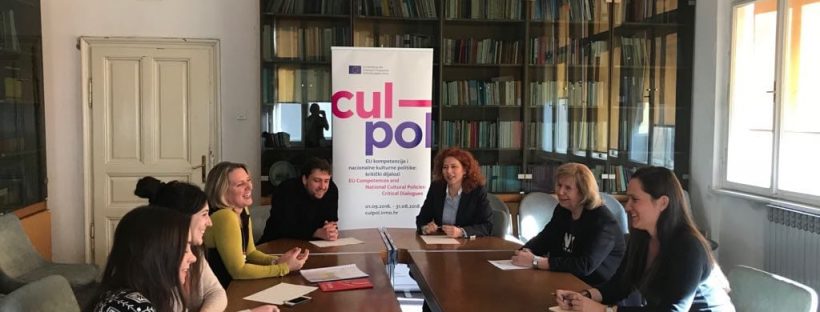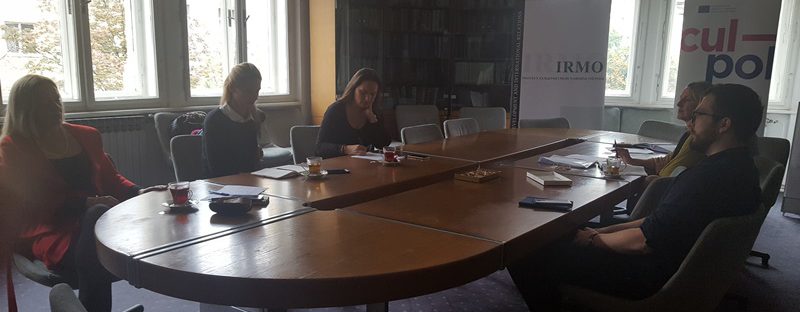Zagreb, 19 – 20 April 2018
An international round table on the Digital Single Market and Its Impact on Culture and Media in Croatia is planned to take place in Zagreb, Croatia, on 19 – 20 April 2018, aiming to gather participants from Croatia and Europe. The round table is organized within the framework of activities of the Jean Monnet project entitled EU Competences and National Cultural Policies: Critical Dialogues (2016-2018), which aims to promote discussion and reflection on the impact of the EU agenda on the Croatian cultural policy. The theme of cultural and media policies in the digital age will be in the focus of the project in 2018.
The Round table will place emphasis on the changes that the Digital Single Market (DSM) strategy brings to the field of culture, and its impact on the culture and media sector in Croatia. The DSM strategy represents a major implicit policy for culture that brings significant changes to the overall cultural and media sector. As cultural production is becoming increasingly digital, the round table discussions will focus on the extent of the influence that the national political governance, and particularly cultural and media policies, have on regulating the digital infrastructure and content underpinning cultural activities. Although the Strategy was adopted two years ago, so far its implications for culture and media have not been discussed adequately in Croatia. As culture and digital culture are increasingly becoming closely interlinked, forming the context that defines our experience, cultural policies must not ignore this important aspect of cultural activities in today’s world.
Cultural Policies in the Digital Age
The cultural policy challenges in the digital context are complex and marked by globalisation, convergence processes and fluid boundaries. In the context of the changes caused by the impact of the digital environment in contemporary society, it is necessary to reflect on our cultural, social and technological development goals, aiming to determine whether complex societal changes are based on democratic principles. One important question is who decides the possible directions and ways of developing and applying technology. Thus, we need to consider what roles cultural policies play today, when digital practices on the one hand, and different public policies on the other, increasingly define the context of digital cultural development. What is their place in the regulation of the cultural space, when the use of digital technologies impacts business and communication models of the cultural sector, and when all aspects of contemporary culture are affected by it? Implicit and explicit cultural policies are being implemented, from the local to the EU level, by public authorities as well as by an active non-governmental sector and foundations advocating their goals in the field of culture and media. Cultural policies are important mechanisms for managing the European political and cultural sphere as they affect how citizens perceive and create culture. An important question is: what kind of cultural policies do we need in order to achieve the best digitization results in the culture and media sector to foster democratic values (freedom of expressions, cultural diversity and media pluralism).
EU Context and DSM: Digital Policies – Cultural Policies
In the European Union, the digital domain is regulated by different public policies that aim to maximize the economic and social potentials of digital technologies. They focus on the issues of digital market fragmentation, interoperability, cybercrime, security, privacy, digital literacy, etc. Since our communication and creativity are increasingly moving into the sphere of digital technologies, the EU regulatory space has a concrete impact on the changes in business and communication models in the cultural and media sectors. It impacts cultural and media sectors whose mode of operation depends not only on accepted institutional and sectorial models and strategies, but also on existing financial mechanisms and the legislative framework. Furthermore, the impact of national policies seems to be decreasing as regulation at the international or the EU level often obliges policies on the national levels to enforce the specific changes. In the context of the subsidiarity principle, EU Member States have the right to take decisions, formulate policies and decide on financing modes in the cultural field. However, as the regulation related to the digital environment mostly arises from other EU public policies, this re-presents an implicit cultural policy that has a significant impact on culture and the media. The question arises whether national cultural policies can still successfully regulate (digital) culture in situations where obligations deriving from other public policies (such as data policies, privacy regulation, copyright, etc.) affect the cultural sector, though in these policies cultural goals are often not taken into account. This situation is an indicator of the marginalization of culture in the digital strategy of the EU, giving rise to the following question – what needs to be done to remedy this?
As the main focus of the EU policies for culture has been placed on the creative economy, which is interlinked with the digital economy, one of the important implicit policies for culture is the Digital Single Market (DSM) strategy, the scope of which includes copyright regulation. With its focus on the digital and data economy, the DSM reform has implications for cultural trade, i.e. the trade of digital cultural goods and services, which consequently opens questions regarding its unintended cultural side-effects for our collective identity. The DSM goal is to ensure high-quality digital services throughout the EU, to create a single EU regulatory space and adequate conditions for the development of innovative digital services. The DSM’s focus is on the economic benefits of the digital economy. It emphasizes the business side of the access to the cultural content. Issues related to cultural diversity are seen quite simplistically – from the distribution point of view – where more content can reach more people through the digital market. The DSM leaves out of its focus the users’ cultural practices in the field of the new media and, more generally, the users’ rights to access and reuse cultural content, as well as the content which is offered under a not-for-profit logic.
Considering the discrepancy between the DSM logic that favours the supranational market principle and the territorial principles within which the instruments of national cultural policies operate, the important question is whether the DSM reform will bring benefits for the entire cultural sector or primarily for the ‘big players’ in the field of creative economy, and whether small Member States will benefit from the proposed reforms? In the context of the current EU reality that faces regulatory fragmentation and fragmented markets in the content sector, where rights need to be negotiated with 28 countries, simplifying this reality represents a significant step forward for the business sector and the consumers. However, the proposed changes lead to the redistribution of revenues from copyright, which is one of the instruments of national cultural policies, without taking into account current models and needs at national levels.
DSM can be understood as an attempt by the European Commission to indirectly reconfigure the European cultural space, as the proposed changes have an impact on the ways in which the cultural sector is managed in the EU Member States. For new policy approaches it is important to find an adequate place for (digital) culture between the market and its broader social context (i.e. between market commodity and public good) and to secure that cultural and artistic objectives of cultural organizations can be supported via business models that ensure the long-term sustainability of digital cultural services. In order to achieve this, there is a need for continuous research in this area. It remains to be seen whether Croatia is prepared for the current and upcoming changes and whether it can influence them?
Programme and Organizational Framework
By bringing together researchers, cultural professionals and policy-makers, this round table aims to promote a dialogue between different cultural-policy stakeholders regarding the changes brought upon the cultural and media sector by the DSM strategy. The round table format will promote focused thematic discussions, which will facilitate the contextualization of the DSM strategy for culture and the media in the EU, focusing mainly on topics such as:
- Digitalization of Cultural Heritage: Overcoming the Obstacles to Access and Usability of Cultural Content
- Copyright, Author’s Rights and Open Data: How to Foster Creativity?
- Updated Audiovisual Media Service Directive: What are the Implications for Culture and the Media?
Gathering participants from Croatia and other European countries, the round table working languages will be Croatian and English (with simultaneous interpretation provided).
Publishing Possibilities:
- Within the framework of the CULPOL project, the publication of a special issue of the journal Croatian International Relations Review (CIRR) is planned for 2018, focusing on the European Union and cultural policy issues. Contributions concerning the impact of DSM on culture are welcome. Please see the call for papers at CULPOL website.
- Contributions are invited for the CULPOL Issue Papers and the CULPOL Commentary series that present selected articles providing critical analysis on various issues reflecting themes concerning the different ways in which the European Union impacts the cultural and media policies on national as well as local levels. Contributions concerning digital cultural policy issues and the impact of DSM on culture are welcome. For more information, please visit https//culpol.irmo.hr/culpol-issue-papers-2/
Programme Board:
- Aleksandra Uzelac, Ph.D., Head of Department and Senior Research Associate at the Department for Culture and Communication and, IRMO (Project Coordinator)
- Jaka Primorac, Ph.D., Senior Research Associate at the Department for Culture and Communication, IRMO
- Romana Matanovac Vučković, Ph.D., Associate Professor, Faculty of Law, University of Zagreb
- Martina Petrović, Head of the Creative Europe Desk – MEDIA Office Croatia
Organisation Board:
- Aleksandra Uzelac, Ph.D., Head of Department and Senior Research Associate at the Department for Culture and Communication and, IRMO (Project Coordinator)
- Jaka Primorac, Ph.D., Senior Research Associate at the Department for Culture and Communication, IRMO
- Paško Bilić, Ph.D., Research Associate at the Department for Culture and Communication, IRMO
- Matea Senkić, Associate at the Department for Culture and Communication, IRMO
- Barbara Lovrinić, External Associate at the Department for Culture and Communication, IRMO
For more information, please visit CULPOL website or contact the organisers via email at culpol@irmo.hr.
Other materials:
Programme-DSM-Round-Table-ENG
DSM_International-Round-Table-Web-Report
Round-table-reader



